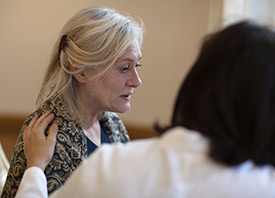Neurocognitive Disorder Treatment in Pinellas County, FL

As we age, there is an expected decline in mental acuity. This impairment in cognitive function is the core symptom of a group of conditions known as neurocognitive disorders (NCD). From Alzheimer's to Huntington’s disease, each NCD has its own unique characteristics, symptoms and cause.
Neurocognitive Decline
To understand neurocognitive disorders, we first need to understand cognitive decline. Cognitive functioning is measured on a specific number of areas called cognitive domains:
- Language/speech
- Learning/memory
- Attention
- Executive functioning (problem-solving)
- Perceptual-motor skills (fine motor skills like drawing)
- Social cognition (understanding social cues)
The diagnosis of neurocognitive disorders depends on how the individual being tested scores on a series of evaluating tests. If their cognitive function is shown to be inhibited in any of the cognitive domains, the condition will likely be classified under one of the following three areas of NCD:
- Major NCD: Must be a severe decline in cognitive function, so drastic that an individual’s ability to function independently (functional independence) is compromised. If your disorder has this effect, it’ll be listed as “major.”
- Mild NCD: Previously called mild cognitive impairment, mild NCD doesn’t affect a person’s ability to function independently, but still presents with cognitive decline (forgetting names, dates, and the like). If you have an NCD and are still able to function, your condition will be listed as “mild.”
-
Delirium: Delirium has its own place under NCD. Typically neurocognitive disorders have a gradual onset, but delirium’s onset is rapid (usually presents in hours and lasts a few weeks) with symptoms that include:
- Lack of attention
- Lack of situational/ environmental awareness
- Speech issues
- Short term memory issues
- Spatial awareness/ perception issues
- Mood swings
- Reversal of sleep cycle (sleeping days, awake nights)
Delirium may also be linked to a medical condition, medications, and substance abuse/ withdrawal, other NCDs are not. Delirium then is an outlier in neurocognitive disorders.
Neurocognitive Disorders
NCDs come in all shapes and sizes, the most common being:
Alzheimer’s disease: A disease with accompanying dementia and impairment of one (mild NCD) or more (major NCD) cognitive domains described earlier. Alzheimer’s has a gradual, sometimes unnoticeable onset with a steady decline in cognitive function. This condition is also thought to be largely created by the accumulation of plaque between brain cells, inhibiting cognitive function.
Traumatic brain injury (TBI): In a traumatic brain injury, cognitive functioning may be inhibited. With a mild TBI, the individual still maintains functional independence and doesn’t need neurological testing or imaging. Major TBI on the other hand requires the evidence of neurological tests/imaging. Functional independence in those with major TBI is greatly impaired. Both major and minor TBIs may cause:
- Loss of consciousness
- Confusion/disorientation (immediately following the injury)
- Post-traumatic amnesia (PTA)
- Symptoms that last beyond acute injury period (required for diagnosis of TBI)
- Any cognitive domain inhibition (required for diagnosis of TBI)
- Recovery that may take weeks or months
Lewy body disease: Also known as Lewy body dementia, LBD is typically associated with Parkinson’s disease . LBD may present with altering levels of cognitive ability, lack of attention/focus, complex and detailed hallucinations and spontaneous symptoms of Parkinson’s disease. Major or mild LBD are determined by functional independence. Other symptoms include:
- Heart rate variability (HRV)
- Hyperhidrosis
- Sexual dysfunction
- Syncope (fainting)
- Aspiration pneumonia (brought on by difficulty swallowing)
- Dry eyes
Cerebrovascular disease: A very common condition and a leading global cause of death, cerebrovascular diseases include conditions like strokes, hemorrhages and associated cardiovascular disease. These varying conditions can lead to cognitive decline because they can cause damage to the brain. A specific term called vascular dementia (VaD), has symptoms that may mimic Alzheimer’s, but from a completely different cause. Both major and mild forms can be diagnosed, given the functional independence and the cognitive domains affected.
Frontal lobar degeneration (FLD): Sometimes called frontotemporal dementia, FLD is a condition in which the frontal and temporal lobes of the brain deteriorate. FLD results in language/speech problems and behavioral issues, most notably increased impulsiveness, lack of empathy/judgement, and motor skill decline (poor coordination, muscle spasms, tremor, difficulty swallowing). Mild or major FLD is largely determined by the need of external care (loss of functional independence).
Huntington’s disease: Huntington’s disease is a debilitating, gradual deterioration of the brain, involving cognitive function and motor skills. Without a cure, those with Huntington’s will eventually progress from a mild to a major neurocognitive disorder.
HIV disease: A key part of HIV is an associated mental deterioration called HIV-associated-dementia or AIDS dementia complex (ADC). Like the conditions already covered, ACD will involve loss of mental sharpness, cognitive ability, and lack of concentration. Both mild and major versions exist.
Neurocognitive disorders represent a large portion of the mental issues affecting both elderly and the young. Many NCDs are treatable. If you believe you may have the early signs of a mild or major NCD, seek help today.
Request more information about neurocognitive disorder treatment today. Call (813) 536-3212 or contact Evolution online.
Evolution
Address
4691 Van Dyke RoadLutz, FL 33558
(813) 536-3212
www.evolution4health.com
Hours
Mon:
10:00 am - 4:00 pm
Tue:
10:00 am - 4:00 pm
Wed:
10:00 am - 5:00 pm
Thu:
10:00 am - 6:00 pm
Fri:
10:00 am - 3:00 pm
Sat:
Closed
Sun:
Closed

